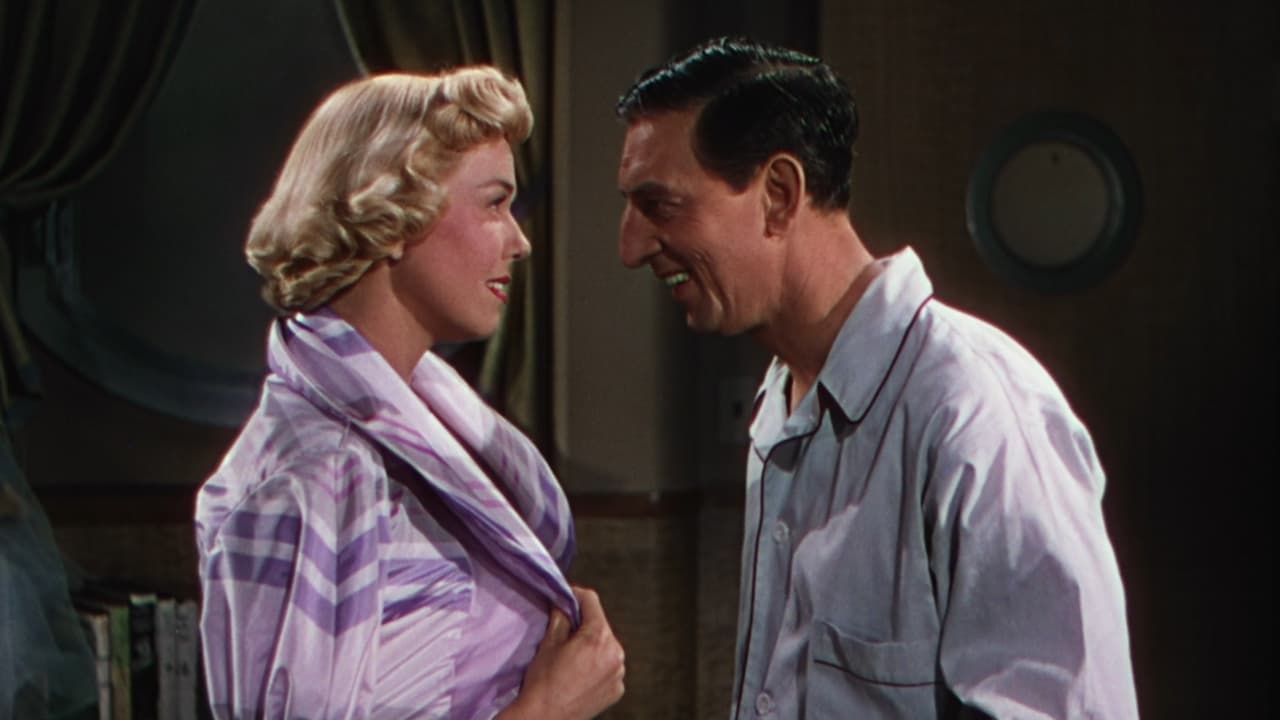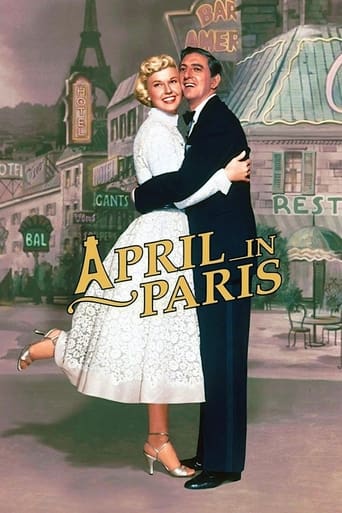Inclubabu
Plot so thin, it passes unnoticed.
Senteur
As somebody who had not heard any of this before, it became a curious phenomenon to sit and watch a film and slowly have the realities begin to click into place.
Kien Navarro
Exactly the movie you think it is, but not the movie you want it to be.
TheLittleSongbird
Before seeing April in Paris I saw a fair few bad things written about it, about Ray Bolger being miscast, the story being disposable and the songs being weak. As someone who liked Doris Day, I went ahead and watched it anyhow. The criticisms are understandable actually, but April in Paris is not as bad as it has been made out to be and is hardly a film without redeeming qualities. Ray Bolger is not really the ideal lead role for Day, he was a likable comic actor when his skills were used well but he is too old here and is more supporting comic role actor than leading man. He and Day don't have very much chemistry either, or one that is completely natural. The story is toilet-paper-thin and contrived- true that not many musicals of that particular time had particularly great stories, but there are not many that are as redundant as the story here- and while there are nice snappy moments the wit and satire in the script isn't sharp enough. April in Paris doesn't look too bad though, one does wish that real Parisian locations and more Parisian fashions were seen and some of the sets are on the garish side but the photography is still attractive and Day's dresses are lovely. The songs are definitely not weak either, "I'm Gonna Ring the Bell Tonight", "April in Paris" and "That's What Makes Paris Par-ee" are simply beautiful songs and while not quite as great the other songs work. While Bolger is not leading man material and his strengths are not really used, his dancing is very light-as-a-feather and he looks very comfortable doing it. Charles Dauphin is charming too, while the choreography and dance routines are at least well-staged and put you in a good mood. Day is the best thing about the film, her singing is just enchantingly beautiful, she's completely at ease and she lights up the screen in everything she does from smiling, dancing, singing and acting. Overall, not a great film but while the criticisms are valid it is better than given credit for and Day is fabulous. 6/10 Bethany Cox
richard-1787
This is a pleasant but basically forgettable musical from a decade that produced far better. The performers are all talented and have done much better elsewhere; they are not to blame. The script is basically boring, and the title very misleading: only the last 15 minutes or so of the movie takes place in Paris. And when it does, it's all painted backdrops. We never really get to Paris.What I found interesting was the post-WW II notion that Americans are very up-tight, especially sexually, and that a trip to Paris could do wonders to loosen them up. (This idea is well presented in the great 1948 Billy Wilder movie, "A Foreign Affair," though there Paris is not the answer, it's just getting out of the American mindset and encountering Europeans.) One of the bright spots of the movie is Doris Day's dance-and-sing number on the ship, "I'm gonna ring the bell tonight," when she encounters the "joie de vivre" of the French crew on the ocean liner and starts to loosen up herself.Later, there is a decent number with Day and the Frenchman, Philippe Fouquet (Claude Dauphin, playing the role that Georges Guétary had played so much better the year before in "An American in Paris") in which the appeal and disappointments of Paris are sketched out.In sum, this is a pretty forgettable movie: forgettable music, certainly, forgettable dialog mostly (though there are a few nasty lines between Day and her female rival), unremarkable story - you never believe there is any real feeling between Ray Bolger and Day - forgettable if energetic dancing. Coming a year after "An American in Paris" - and no doubt meant to play off the success of that movie - this is pretty much a letdown. Even the scenes of Paris are fake.
Panamint
Doris Day is fun in this movie. Her smile lights up the screen, her rendition of the title song is not corny- it is terrific. Her dancing is vivacious and guaranteed to brighten up your day.Bolger's dancing is a bit vaudevillian but has a happy uniqueness that is very watchable. Many of his moves are like a series of "controlled falls" that require tremendous balance- this is harder than it looks. On the other hand some of his dance is very above-average tap or two-step. Overall he seems to combine a lot into his different routines. As a bonus, his acting is not bad and better than you might expect.This film suffers from cheapness and a nothing plot, but is overcome by exceptional talent and charm by all the cast. Who cares if it is cheap and set-bound? The results are entertaining and that's the true bottom line.
Neil Doyle
True, even for the breezy 1950s, the plot for this musical is as light as a feather--but if you are a DORIS DAY fan, as I certainly was during these early Day films at Warner Bros., you'll be enchanted by her way with a song--particularly "I'm Gonna Ring the Bell Tonight", "April in Paris" and "That's What Makes Paris Par-ee". And on top of that, she excels in all of her dance routines, even those in which RAY BOLGER clearly has the spotlight to himself.It's one of those mistaken identity plots that Warners used extensively throughout the '40s and '50s, something about a showgirl being mistaken for a diplomat and mistakenly invited to represent the U.S. at a French festival. Naturally, all is straightened out in time for a happy ending although I can't say I detected any real chemistry between Bolger and Day--even in a musical where logic doesn't really matter.The dances staged by LeRoy Prinz are not the best, but there are some cheerful, well staged moments when Bolger gets to do his tap routines and limber legged dancing. All in all, it passes the time pleasantly if you have a weakness for musicals the way they were in the '50s. And Doris proves that singing wasn't her only asset. Her dancing is also very professional (and not surprisingly, she intended to become a dancer before an accident ruined her plans and she switched to singing).

